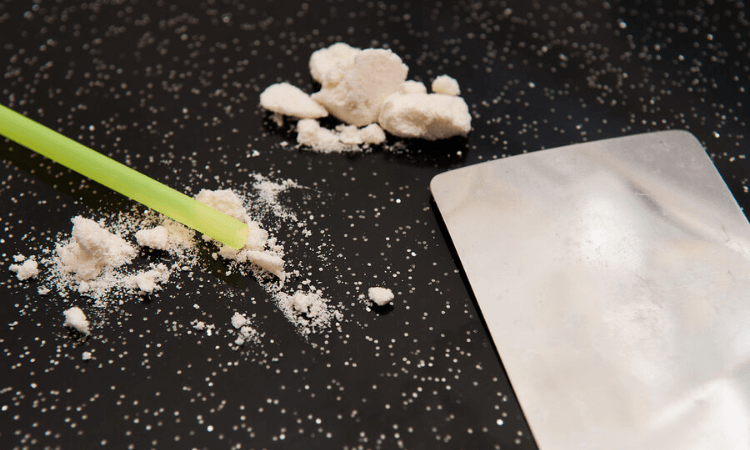
Freebase cocaine is a highly addictive stimulant that people smoke for its intoxicating effects. Producing freebase cocaine is a hazardous process that can lead to fires and explosions.
Cocaine exists in two forms on the street—powdered and base. Base cocaine includes freebase cocaine and crack. It is generally any form of the drug not made using an acid that turns it into powder. Like other forms of cocaine, freebase can cause extensive harm to the body. It can lead to severe physical and emotional health problems, including dependence and addiction.
Risks and Dangers of Freebase Cocaine
When smoked, freebase cocaine is delivered to the brain more rapidly than powdered cocaine that is usually snorted. Moreover, smoking cocaine sends it to the lungs, through the heart, and then directed into the brain. By comparison, snorted cocaine takes a more extended path to reach the brain.
As a result, freebase cocaine induces intense euphoric effects that are very brief and last between 2-3 minutes. The intensity of these effects can result in an overdose less than one minute after a person uses the form of cocaine.
The brevity of the high also compels many people to repeatedly use the drug in a binge-like pattern, which further serves to foster both dependence and addiction. The effects of freebasing cocaine occur almost instantaneously, as it enters the bloodstream and the brain within 15 seconds. Once it enters the brain, there is an intense “rush” or feeling of euphoria with a high that lasts about 30 minutes.
Side Effects of Freebase Cocaine

The high is intense and onsets rapidly. However, it does not last long, and a crash or come down follows. When euphoria begins to subside, the user may begin to experience extreme fatigue, anxiety, depression, irritability, and paranoia. These effects often prompt users to repeat the experience to avoid them for as long as possible.
Acute effects of freebase cocaine include sweating, nausea, insomnia, and headache. Long-term effects include mood changes, general irritability, restlessness, anxiety, depression, paranoia, and hallucinations.
Also, the method of smoking cocaine is beset with its own adverse health effects, including respiration issues, damage to the mouth and lungs, and a higher likelihood of developing various forms of cancer. With chronic use, respiratory and heart problems, including heart attack, can occur, as well as stroke and seizures.
Other risks of freebasing cocaine include burns to the face or fingers from pipes, matches, or lighters during use. Also, users may be more vulnerable to accidents, injuries, and violence that occurs while under the influence of cocaine.
Because cocaine in any form is addictive, people who use it often have drug cravings. To satisfy these, they may repeatedly smoke freebase despite being aware of potential health consequences. They might steal money or other items or turn to prostitution to support their drug use. Finally, those who are dependent and abruptly quit will experience withdrawal symptoms. These may include agitation, restlessness, anxiety, and depression.
Freebase Cocaine vs. Crack
Although freebase and crack are the same chemical form of cocaine and can be smoked, they are not the same. Freebase cocaine is made by dissolving powdered cocaine in water and adding a base product and a solvent.
Ether is a highly flammable solvent frequently used to make freebase cocaine and can cause explosions during the manufacturing process. Some ether can remain in the product and cause burns when a person smokes it. Because crack is considered to be less risky to produce and use than freebase, the prevalence of freebasing has decreased significantly in recent years.
Treating Freebase Cocaine Addiction
People who are abusing any form of cocaine, including freebase, should seek professional help as soon as possible. Addiction treatment programs such as those offered by Recovery in Tune can help people manage unpleasant and painful withdrawal symptoms in a safe, comfortable environment. We employ evidence-based therapies, such as behavioral therapy and drug counseling, that teach people better methods of coping and address the underlying reasons for drug abuse in the first place.
Even after completing intensive rehab, people in recovery from addiction face triggers that increase their risk of relapse, as they return to environments that lead to cravings that include people or places that are reminiscent of cocaine use. To avoid relapse following initial treatment, people in recovery should continue to take advantage of outpatient programs, aftercare planning services, and support groups that foster accountability.
Addiction to freebase cocaine, crack, or powder cocaine can be a devastating and life-threatening condition. But, you don’t have to try to overcome it alone. Contact us if you are ready to take the first step to getting sober and begin the road to recovery today!